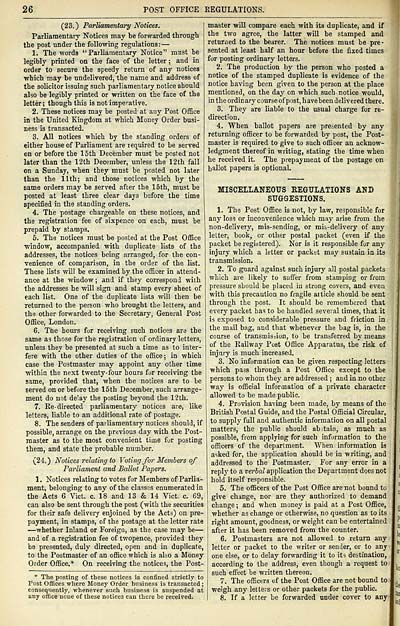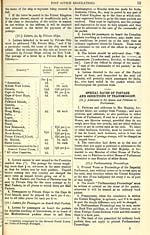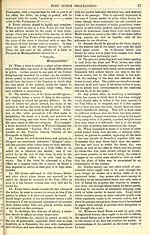Download files
Complete book:
Individual page:
Thumbnail gallery: Grid view | List view

26
POST OFFICE EEGULATIONS.
(23.) Parliamentary Notices.
Parliamentary Koticea may be forwarded through
the post under the following regulations: —
1. The words "Parliamentary Notice" mast be
legibly printed on the face of the letter ; and in
order to secure the speedy return of any notices
■which may be undelivered, the name and address of
the solicitor issuing such parliamentary notice should
also be legibly printed or written on the face of the
letter; though this is not imperative.
2. These notices may be posted at any Post Office
in the United Kingdom at which Money Order busi-
ness is transacted.
3. All notices which by the standing orders of
either house of Parliament are required to be served
on or before the 15th December must be posted not
later than the 12th December, unless the 12th fall
on a Sunday, when they must be posted not later
than the 11th; and those notices which by the
same orders may be served after the 15th, must be
posted at least three clear days before the time
specified in the standing orders.
4. The postage chargeable on these notices, and
the registration fee of sixpence on each, must be
prepaid by stamps.
5. The notices must be posted at the Post Office
■window, accompanied with duplicate lists of the
addresses, the notices being arranged, for the con-
venience of comparison, in the order of the list.
These lists will be examined by the officer in attend-
ance at the window ; and if they correspond with
the addresses he will sign and stamp every sheet of
each list. One of the duplicate lists will then be
returned to the person who brought the letters, and
the other forwarded to the Secretary, General Post
Office, London.
6. The hom-s for receiving such notices are the
same as those for the registration of ordinary letters,
unless they be presented at such a time as to inter-
fere with the other duties of the office; in which
case the Postmaster may appoint any other time
within the next twenty-four hours for receiving the
same, provided that, when the notices are to be
served on or before the 15 th December, such arrange-
ment do not delay the posting beyond the 12th.
7. Re- directed parliamentary notices are, like
letters, liable to an additional rate of postage.
8. The senders of parliamentary notices should, if
possible, arrange on the previous day with the Post-
master as to the most convenient time for posting
them, and state the probable number.
(24.) Notices relating to Voting for Memhers of
Parliament and Ballot Papers.
1 . Notices relating to votes for Members of Parlia-
ment, belonging to any of the classes enumerated in
the Acts 6 Vict. c. 18 and 13 & 14 Vict. c. 69,
can also be sent through the post (with the securities
for their safe delivery enjoined by the Acts) on pre-
payment, in stamps, of the postage at the letter rate
— whether Inland or Foreign, as the case may be —
and of a registration fee of twopence, provided they
be presented, duly directed, open and in duplicate,
to the Postmaster of an office which is also a Money
Order Office,* On receiving the notices, the Post-
* The posting of these notices is confined strictly to
Post Offices -where Money Order business is transacted ;
consequently, whenever such business is suspended at
any office none of these notices can there be received.
master will compare each with its duplicate, and if
the two agree, the latter wiU be stamped and
returned to the bearer. The notices must be pre-
sented at least half an hour before the fixed times
for posting ordinary letters.
2. The production by the person who posted a
notice of the stamped duplicate is evidence of the
notice having been given to the person at the place
mentioned, on the day on which such notice would,
in the ordinary course of post, have been delivered there.
3. They are liable to the usual charge for re-
direction.
4. When ballot papers are presented by any
returning officer to be forwarded by post, the Post-
master is required to give to such officer an acknow-
ledgment thereof in writing, stating the time when
he received it. The prepayment of the postage on
ballot papers is optional.
MISCELLANEOUS EEGULATIONS AND
SUGGESTIONS.
1. The Post Office is not, by law, responsible for
any loss or inconvenience which may arise from the
non-delivery, mis-sending, or mis-delivery of any
letter, book, or other postal packet (even if the
packet be registered). Nor is it responsible for any
injury which a letter or packet may sustain in its
transmission.
2. To guard against such injury all postal packets
which are likely to suffer from stamping or from
pressure should be placed in strong covers, and even
with this precaution no fragile article should be sent
through the post. It should be remembered that
every packet has to be handled several times, that it
is exposed to considerable pressure and friction in
the mail bag, and that whenever the bag is, in the
course of transmission, to be transferred by means
of the Railway Post Office Apparatus, the risk of
injury is much increased.
3. No information can be given respecting letters
which pass through a Post Office except to the
persons to whom they are addressed ; and in no other
way is official information of a private character
allowed to be made public.
4. Provision having been made, by means of the
British Postal Guide, and the Postal Official Circular,
to supply full and authentic information on all postal
matters, the public should abitaio, as much as
possible, from applying for such information to the
officers of the department. When information is
asked for, the application should be in writing, and
addressed to the Postmaster. For any error in a
reply to a verbal application the Department does not
hold itself responsible.
5. The officers of the Post Office are not bound to
give change, nor are they authorized to demand
change ; and when money is paid at a Post Office,
whether as change or otherwise, no question as to its
right amount, goodness, or weight can be entertained
after it has been removed from the counter.
6. Postmasters are not allowed to return any
letter or packet to the writer or sender, or to any
one else, or to delay forwarding it to its destination,
according to the address, even though a request to
such effect be written thereon.
7. The officers of the Post Office are not bound to
weigh any letters or other packets for the public.
8. If a letter be forwarded under cover to any
I
POST OFFICE EEGULATIONS.
(23.) Parliamentary Notices.
Parliamentary Koticea may be forwarded through
the post under the following regulations: —
1. The words "Parliamentary Notice" mast be
legibly printed on the face of the letter ; and in
order to secure the speedy return of any notices
■which may be undelivered, the name and address of
the solicitor issuing such parliamentary notice should
also be legibly printed or written on the face of the
letter; though this is not imperative.
2. These notices may be posted at any Post Office
in the United Kingdom at which Money Order busi-
ness is transacted.
3. All notices which by the standing orders of
either house of Parliament are required to be served
on or before the 15th December must be posted not
later than the 12th December, unless the 12th fall
on a Sunday, when they must be posted not later
than the 11th; and those notices which by the
same orders may be served after the 15th, must be
posted at least three clear days before the time
specified in the standing orders.
4. The postage chargeable on these notices, and
the registration fee of sixpence on each, must be
prepaid by stamps.
5. The notices must be posted at the Post Office
■window, accompanied with duplicate lists of the
addresses, the notices being arranged, for the con-
venience of comparison, in the order of the list.
These lists will be examined by the officer in attend-
ance at the window ; and if they correspond with
the addresses he will sign and stamp every sheet of
each list. One of the duplicate lists will then be
returned to the person who brought the letters, and
the other forwarded to the Secretary, General Post
Office, London.
6. The hom-s for receiving such notices are the
same as those for the registration of ordinary letters,
unless they be presented at such a time as to inter-
fere with the other duties of the office; in which
case the Postmaster may appoint any other time
within the next twenty-four hours for receiving the
same, provided that, when the notices are to be
served on or before the 15 th December, such arrange-
ment do not delay the posting beyond the 12th.
7. Re- directed parliamentary notices are, like
letters, liable to an additional rate of postage.
8. The senders of parliamentary notices should, if
possible, arrange on the previous day with the Post-
master as to the most convenient time for posting
them, and state the probable number.
(24.) Notices relating to Voting for Memhers of
Parliament and Ballot Papers.
1 . Notices relating to votes for Members of Parlia-
ment, belonging to any of the classes enumerated in
the Acts 6 Vict. c. 18 and 13 & 14 Vict. c. 69,
can also be sent through the post (with the securities
for their safe delivery enjoined by the Acts) on pre-
payment, in stamps, of the postage at the letter rate
— whether Inland or Foreign, as the case may be —
and of a registration fee of twopence, provided they
be presented, duly directed, open and in duplicate,
to the Postmaster of an office which is also a Money
Order Office,* On receiving the notices, the Post-
* The posting of these notices is confined strictly to
Post Offices -where Money Order business is transacted ;
consequently, whenever such business is suspended at
any office none of these notices can there be received.
master will compare each with its duplicate, and if
the two agree, the latter wiU be stamped and
returned to the bearer. The notices must be pre-
sented at least half an hour before the fixed times
for posting ordinary letters.
2. The production by the person who posted a
notice of the stamped duplicate is evidence of the
notice having been given to the person at the place
mentioned, on the day on which such notice would,
in the ordinary course of post, have been delivered there.
3. They are liable to the usual charge for re-
direction.
4. When ballot papers are presented by any
returning officer to be forwarded by post, the Post-
master is required to give to such officer an acknow-
ledgment thereof in writing, stating the time when
he received it. The prepayment of the postage on
ballot papers is optional.
MISCELLANEOUS EEGULATIONS AND
SUGGESTIONS.
1. The Post Office is not, by law, responsible for
any loss or inconvenience which may arise from the
non-delivery, mis-sending, or mis-delivery of any
letter, book, or other postal packet (even if the
packet be registered). Nor is it responsible for any
injury which a letter or packet may sustain in its
transmission.
2. To guard against such injury all postal packets
which are likely to suffer from stamping or from
pressure should be placed in strong covers, and even
with this precaution no fragile article should be sent
through the post. It should be remembered that
every packet has to be handled several times, that it
is exposed to considerable pressure and friction in
the mail bag, and that whenever the bag is, in the
course of transmission, to be transferred by means
of the Railway Post Office Apparatus, the risk of
injury is much increased.
3. No information can be given respecting letters
which pass through a Post Office except to the
persons to whom they are addressed ; and in no other
way is official information of a private character
allowed to be made public.
4. Provision having been made, by means of the
British Postal Guide, and the Postal Official Circular,
to supply full and authentic information on all postal
matters, the public should abitaio, as much as
possible, from applying for such information to the
officers of the department. When information is
asked for, the application should be in writing, and
addressed to the Postmaster. For any error in a
reply to a verbal application the Department does not
hold itself responsible.
5. The officers of the Post Office are not bound to
give change, nor are they authorized to demand
change ; and when money is paid at a Post Office,
whether as change or otherwise, no question as to its
right amount, goodness, or weight can be entertained
after it has been removed from the counter.
6. Postmasters are not allowed to return any
letter or packet to the writer or sender, or to any
one else, or to delay forwarding it to its destination,
according to the address, even though a request to
such effect be written thereon.
7. The officers of the Post Office are not bound to
weigh any letters or other packets for the public.
8. If a letter be forwarded under cover to any
I
Set display mode to: Large image | Transcription
Images and transcriptions on this page, including medium image downloads, may be used under the Creative Commons Attribution 4.0 International Licence unless otherwise stated. ![]()
| Scottish Post Office Directories > Towns > Glasgow > Post-Office annual Glasgow directory > 1877-1878 > (994) |
|---|
| Permanent URL | https://digital.nls.uk/84456552 |
|---|
| Description | Directories of individual Scottish towns and their suburbs. |
|---|
| Description | Around 700 Scottish directories published annually by the Post Office or private publishers between 1773 and 1911. Most of Scotland covered, with a focus on Edinburgh, Glasgow, Dundee and Aberdeen. Most volumes include a general directory (A-Z by surname), street directory (A-Z by street) and trade directory (A-Z by trade). |
|---|


